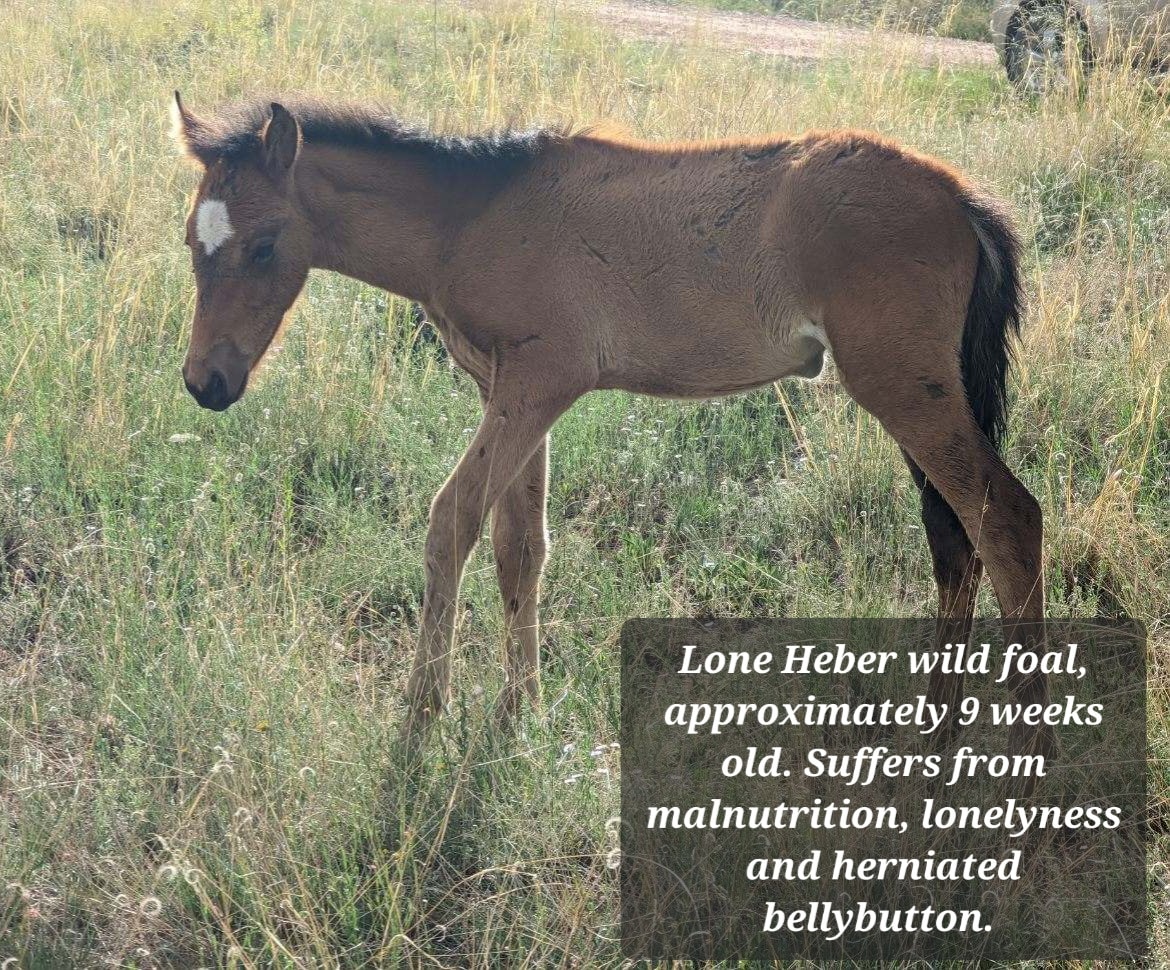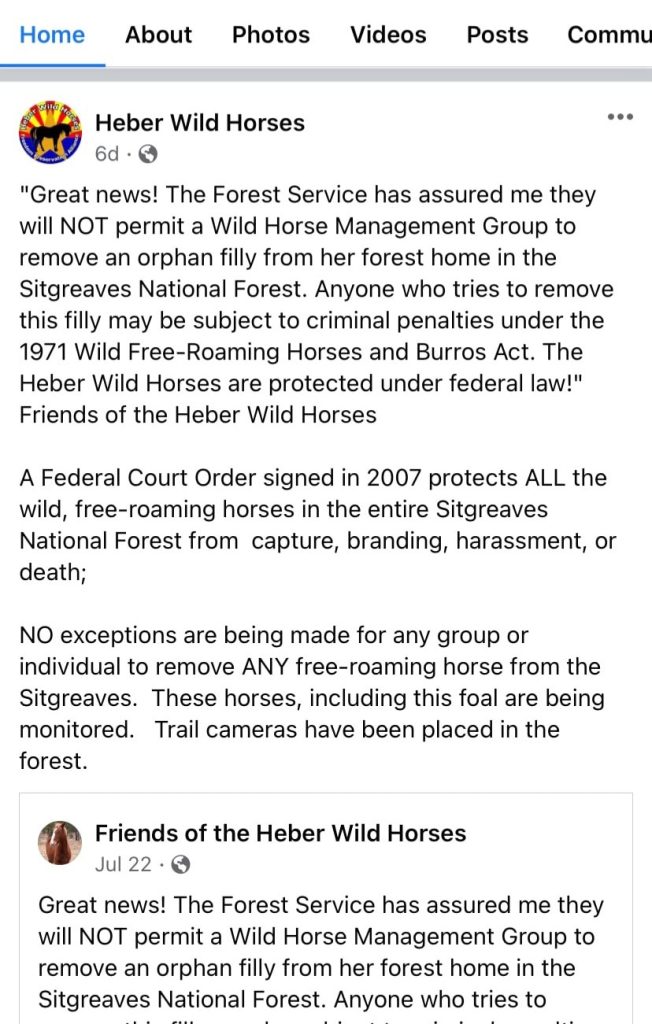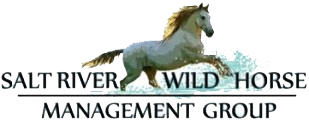
There is a way to manage wild horses humanely, and this is not it.
July 29th
Much has been said about this lone foal in Heber in response to the video we posted on 7.25.22 stating our concern for this foal, and maybe too much.


She is “just fine”, this lady said, and posted genuine happiness about the fact that the foal cannot be rescued, on her page called “friends of Heber wild horses”. This was shared by the page called “Heber wild horses” which is run by a single individual who does not live local, who added her usual false and defamatory statements about our organization, which was shared by yet another page, (also set up by one single woman) that was actually made with the specific purpose to spread false information and discredit our organization.
Usually we don’t pay any mind to these types of posts, but because many people care about this issue, we want to follow up with the truth about this case, especially, because it’s only one example of many more. (The Forest Service admitted there are 2 other foals just like this in the same forest.)
What is important to understand, and what everyone needs to admit, is that wild foals under 3 months of age, (4 months if domestic) cannot and will not survive without proper milk protein, not even in anyone’s wildest dreams. That is not misinformation, but equine science.
Using the “wild is wild” approach these “pages” (all single individuals) use, this foal would have already succumbed, therefore claims of just “monitoring” cannot be truthful. Besides, it may be obvious that “monitoring” does not actually help a foal survive. Therefore, if any of these claims are somewhat true, there is only one conclusion, which is that someone must be feeding this foal a milk replacer.
If that is the case, we might just feel a little better, and so might the public, so it should be disclosed! However, it would turn this into a very big hypocrisy, because the pretense is that she will be “just fine” on her own. In addition feeding a foal would be the exact opposite of the “wild is wild” motto, so adamantly promoted by these “pages” (who are in reality single individuals.)
The same motto is used to bash our organization for rescuing orphans and horses in detrimental situations. The cheapest accusation these “pages” use is that we, SRWHMG, do it all “for donations”.
It’s a cheap and easy accusation, because of course non profit organizations have to ask for donations; we could not do what we do without resources. But if anyone makes illusions that there is money in managing wild horses, they obviously do not know current hay prices, or what it takes to provide a good sanctuary, veterinary care and actual field management.
We are an accredited organization in good standing and our financials are public record. We work hard to prove that sustainable wild horse management is the alternative to cruel roundups and removals. Our kind of management actually keeps the Salt River wild horses, wild. No Salt River wild horse has ever been removed, with the exception of the ones who needed rescue and sanctuary.
So instead of bashing and attempting to make our organization look stupid for genuine concern, there needs to be some honesty about this situation. Nature can be cruel and that is no one’s fault, but the public should not be fooled into thinking that foals miraculously will be “just fine” or will be rescued by bachelor stallions, because nothing could be further from the truth. If someone is genuinely trying to look after this foal, let us know.
Here is an official statement from our SRWHMG veterinarian:
“This lone Heber wild foal is approximately 8 to 10 weeks old, has all the signs of malnutrition (a long rough coat under which bones are showing) and she has a herniated bellybutton. Foals under 16 weeks old, need milk protein to survive and companionship for their emotional well-being. Each day she is alone in the forest, she suffers and is left at great risk. This baby, even while born in the wild, deserves every chance to survive without pain and therefore should be rescued into a safe environment, as offered.”
– SRWHMG veterinarian, Jennifer F Johnson VMD, CVPP, president, International Veterinary Academy of Pain Management.
However, as we previously mentioned in our post, we will not do anything without authorization. We are not in charge of managing the Heber wild horses, but to be clear, neither are any other horse advocates or individual women, even while they may act and pretend. We have just as many volunteers who live in the Heber area as these ladies do, and anyone has just as much right to watch and monitor the Heber wild horses as anyone else. The more horse advocates the better.
A wild horse herd is always managed by the agency in charge of the land they live on, this can be the BLM or the Forest Service or a reservation. In this case, it is the Apache Sitgreaves National Forest, which is the same Forest Service that is aiming to remove the entire herd of Alpine wild horses, as well as 80% of the Heber wild horses.
Unlike the Alpine wild horses, the Heber wild horses are protected under the 1971 Wild Free Roaming Horse and Burro Act, and can legally be managed humanely under that act as intended. Both the Forest Service in other areas, as well as the BLM, alert horse rescues regularly when foals are orphaned or separated in the wild. It is in fact the responsibility of these agencies to do the humane thing. There is no difference for the herd if the foal dies or if she gets rescued.
The Apache Sitgreaves Forest Service, also wrote a response on their Facebook page, and stated that the 2007 legal case prevents them from removing horses until a long term management plan has been approved. This is technically true, except that we do not believe this includes rescue for humane reasons.
The Forest Service has a lot of discretion in the way they chose to act.
So it is our sincere hope that either this foal will get lucky and survive, or that the Forest Service will change their mind and let someone, anyone, rescue this foal plus any others that are under 3 months old and abandoned.
Please do not blame us for not illegally rescuing the foal, but instead make a call to the Forest Service (928) 333-6280 or (928)235-5764 and state that you care about this foal, and also about humane management for both the Heber wild horses and the Alpine wild horses.
There is a way to manage wild horses humanely, and this is not it.
Sincerely, SRWHMG.
